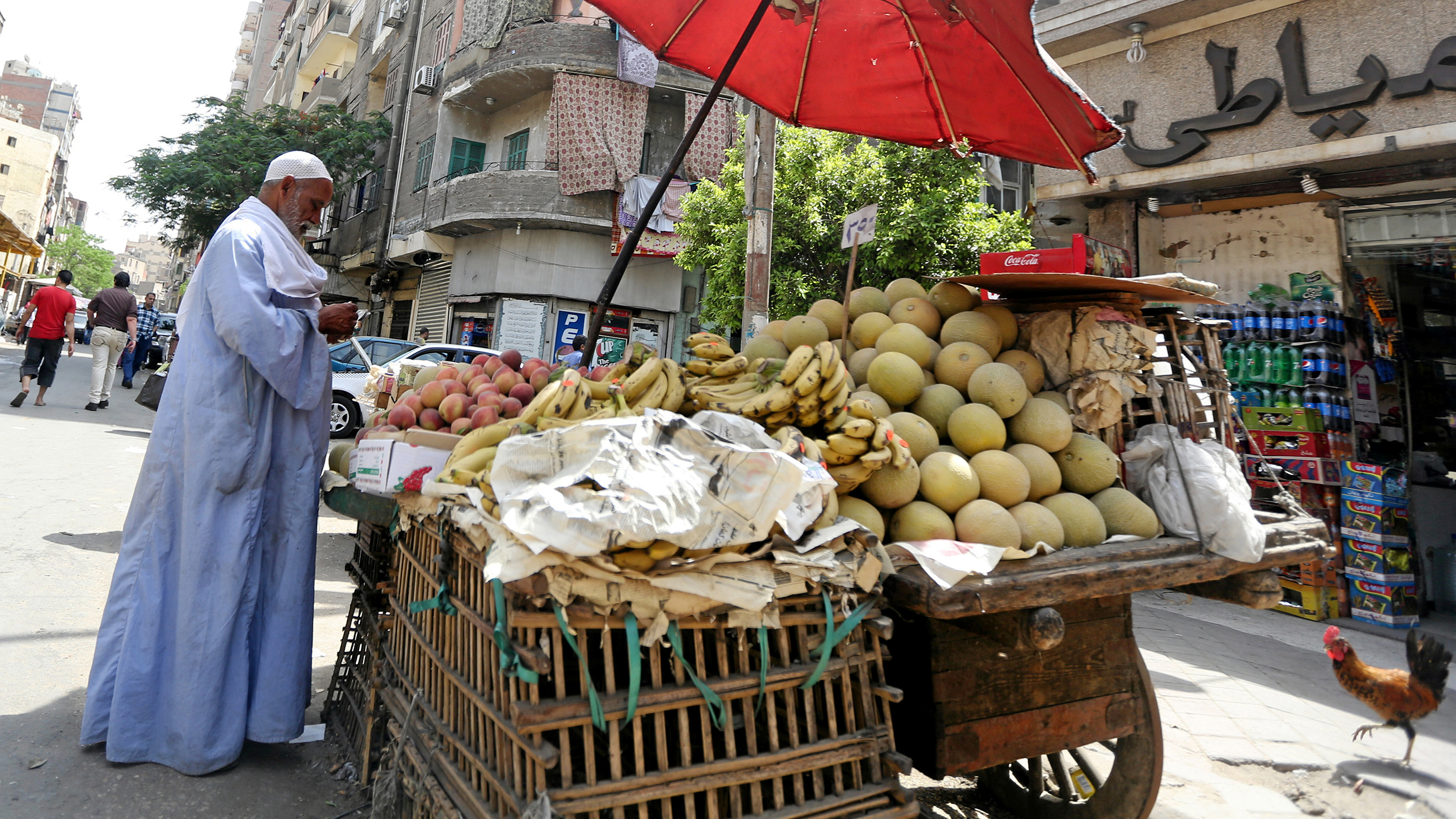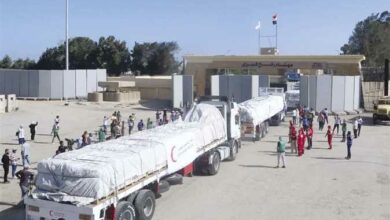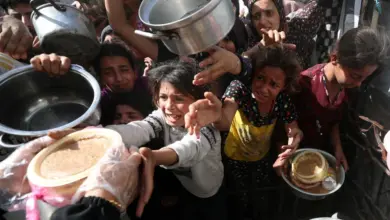The past three months have witnessed a sudden increase in food prices that has forced most Egyptians to make the difficult choice between empty wallets and rumbling stomachs. This accelerated inflation can be most clearly measured by observing the meat industry, with a kilo of regular local beef costing up to LE7 more today than it did in January. To make matters worse, supplies of meat, whether imported or homegrown, seem to be dwindling, leaving consumers asking, where’s the beef, and more importantly, why is it so expensive?
To find out, Al-Masry Al-Youm visited the Ministry of Social Solidarity’s "Department of Meat." After several failed attempts at reaching Major General Mohamed Abu Shady, the man “in charge of the meat”—or at least, of making any official government statements regarding meat—this reporter had all but given up hope when he was discreetly approached by an apparently sympathetic employee of the department. Crossing paths in a crowded hallway, the anonymous source initiated contact by pausing long enough to whisper, “the meat market is rotten and so is all the meat,” before continuing on his way, glancing over his shoulder to make sure his message had been delivered.
Minutes later, in one of the building’s many unoccupied offices, the jittery but otherwise friendly employee explains the mechanics of a dysfunctional food chain. “Not that long ago, there were 10 or 12 different importers bringing in the meat. Now there are only two,” he says. According to him, the majority of importers have given up on their business due to the excessive demands imposed on them by the government. For each shipment of frozen meats, importers must receive permits from the Ministries of Health, Trade, and Agriculture, as well as a series of sub-committees and councils. Until the permits are presented, the imported meat is kept in quarantine, which importers pay for on a daily basis, the source explains.
“The importers are in this to make money. They don’t like having to pay by the day for meat that they don’t believe should be quarantined in the first place,” says the source. “Their argument is that the meat has already been examined before leaving its country of origin.”
By law, importers are obligated to assemble a team of veterinarians and doctors to examine any shipment of meat before it is exported to Egypt. "Now, importers have to pay for everything, including their doctors’ travel and accommodation expenses," the source added. The result is a highly unreliable evaluation system.
“These doctors don’t make that much money,” the unnamed employee explains. “So, when they’re doing work assigned by the government, but getting paid for it by the importers, where do you think their loyalties lie?”
The reality of this situation can be witnessed in the history of innumerable scares triggered by shipments of tainted or low-grade meat, the most recent example occurring two weeks ago when several thousand tons of Indian beef were reported to be infected with Sarcocystis worms. The case was well documented in the local media.
“You know where those doctors were?” he smirks, referring to the Sarcocystis-condoning doctors. “Dubai. Buying toys for their kids, perfumes for their wives, and dresses for their girlfriends.”
The doctors, he claims, never went to India—“they rarely do.”
Sitting behind a desk positioned between his butchery’s chopping block and meat locker, Hajj Ahmed Fathi offers his take on the ongoing meat crisis. Coming from a long line of butchers, Hajj Fathi is as aware of the politics of his business as he is of its current critical condition. “The government needs to increase the amount of livestock farms. It’s ridiculous, the way this country’s human population is skyrocketing, while the amount of livestock stays the same.”
Hajj Fathi insists that there are several factors contributing to the current crisis, all manifesting from the government’s lack of involvement in the meat industry. Chief among them, he claims, is the desire to make a quick profit. “Greed cancels out logic,” he frowns. “Calves and heifers are more commonly butchered than bulls, which is plain stupid because they would eventually produce not only other cows, but dairy products as well.” According to Hajj Fathi, a growing number of livestock farmers butcher their young livestock instead of suffering the expenses required to properly feed and nurture the animals to an age more suitable for consumption. The meat is then taken to butchers who, as Fathi puts it, are “in on the scam” for a share of the profits. The butchers cut up the young, passing the pieces off as beef from a grown bull. “Meat is meat,” Fathi says with a bitter laugh. “Once it’s cut up and lying in a lump in front of you, it’s hard to tell where it came from.”
The solution, he claims, will only come with the firm implementation of government laws. “Most of these cases occur out in rural areas and farmlands, where there’s no government supervision whatsoever,” Hajj Fathi states. “But it does also happen in the city. Either way, it’s a web, it’s all interwoven.” He locks his thick fingers together, illustrating his point.
“We need to demand tighter government regulation,” he says, firmly. “Especially in rural areas. We need laws that strictly prohibit the butchering of any cow less than 350 kilograms, and we need these laws to be enforced.”
A few hours later in a downtown ‘ahwa, Hajj Ali Hassanein and Hajj Sabry Balaha share their similar views. Hassanein, a butcher for almost four decades and one of the local community leaders in Sayyeda Zeinab, lets out a thick stream of shisha smoke before offering his solution. “The government sets up all these organizations and ministries to take care of women and children. They need to do likewise for our animals, so we can make the most of their meat.” The current state of the meat market leaves it prone to all sorts of corruption and rural conspiracy theories, he says, adding, “When farmers butcher their cows, which are cheaper to buy than bulls, it’s not just so they can get bull prices for cow meat. They’re also consciously creating a dairy product drought, which they use as an excuse to sell milk which they’ve stored from their cows at increased prices.”
Hajj Balaha, who operates out of his own abattoir, nods in agreement. “This is how it works,” he says. “When meat prices increase, so does everything else. Fishmongers and chicken farmers take advantage of the situation and increase their prices too. Nobody wants to get left behind.” He sets down his glass of tea to count off on his fingers all the problems spawned by the government’s negligence. “Importers are doing everything they can to wipe out this country’s wealth of livestock,” Balaha repeatedly slaps his palm down on the table, his tea spilling over. “They know people prefer local meat, and will only turn to imported beef when there’s no other option.”
“This whole crisis was inevitable,” Hajj Hassanein interjects while Balaha tries to dab the tea stain off of his blood-speckled galabeya . “It just unfolded quicker because of bad timing. Eid el-Adha almost emptied out what was an already dwindling supply, having never truly recovered from the increase in demand resulting from long-lasting bird-flu fears. And then swine flu came along and the small market for pork—mainly Christians and hotels and some fancy restaurants—shifted over to bovine needs. In the end, demand crippled the market.”
At this point, the shisha boy who came over to help clear the mess caused by Balaha decides to join the conversation. “I don’t know about this ‘lack of meat’ crisis you guys are talking about,” the young man mutters as he walks off with the empty glasses. “There’s at least 80 million cows out there and the government’s doing a fine job slaughtering them all.”




